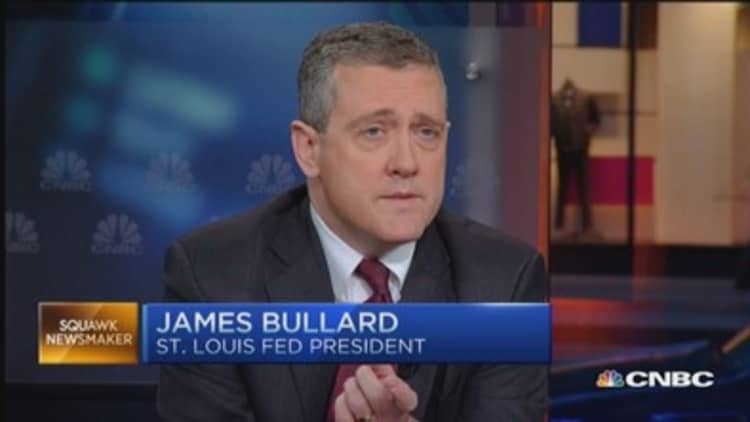The U.S. unemployment rate has fallen to 5.5 percent—the lowest since 2008—according to the latest figures, but one segment of the population isn't cheering just yet.
Military veterans are almost twice as likely as nonveterans to start their own business, but their unemployment rate stands at 6.7 percent as of February, and has been consistently higher than the national average, according to the Small Business Administration. (Tweet This)
For a variety of reasons, the solution to joblessness among veterans may be to prod more of them toward entrepreneurship.
"This gap is a nut that's hard to crack, but I actually truly believe that veteran-owned businesses are going to be the thing that heals our country in the next 15 years," said Michael Zacchea, a retired Marine lieutenant colonel and director of the University of Connecticut's Entrepreneurial Bootcamp for Veterans with Disabilities.
Read MoreWall Street offers veterans a foot in the door
Finding a job with established companies can be a tough task for vets. Rosita Campbell specialized as a financial technician in the Air Force from age 17. After retirement from the military, Campbell struggled to find a job. She interviewed for one that she says was an "exact equivalent" of her position in the Air Force. But she was rejected by the employer, who said Campbell was only a "child" when she performed that job in the military.
"I didn't know there was age discrimination and military status discrimination when looking for jobs," Campbell said.
More than 43 percent of the respondents to a Veterans Job Retention Survey published in February 2014 managed to hold onto their first post-military job for only 12 months or less.
Campbell fixed her own problems. She now owns and runs Freedom Fitness Center, a small business that targets bodybuilders and other customers with meal plans and organic food.
'Churning these veterans'
The Entrepreneurial Bootcamp for Veterans with Disabilities program trains veterans in the fundamentals of kickstarting a small business. Zacchea said that even though some states receive monetary incentives from the federal government to hire veterans, those measures don't guarantee long-term employment.
"Some employers are churning these veterans," he said. "They would hire them, get paid for it and fire them. What they really need to do is try for retention."

Obviously, entrepreneurship carries inherent risks and isn't a panacea for every veteran.
Justin Nash's start-up, Veteran Construction Services, has brought in only $300,000 in revenue over 2½ years. The amount could have tripled or even quadrupled, said Nash, a former Army captain, if he had received greater support in the form of capital or state-sponsored programs. As a construction contractor, Nash said, assistance with the maintenance and renewal of required licenses would also be a big help.
Read MoreVeterans deserve more than just a job
The Small Business Administration does not provide direct loans to veterans, said Barbara Carson, acting associate administrator for the Office of Veterans Business Development. Rather, veterans are exempt from borrower fees for a loan value of up to $350,000. For a loan between $351,000 to $5 million, the agency promises to pay half of the borrower fee in case of default.
Carson said for fiscal 2014, the agency granted $768 million in lending. She was unable to provide a figure for fiscal 2013 but said the two numbers were not drastically different.
Frankly, in our education system, starting a business is not often taught as a possibility. We are taught to get a job, or to go to college or go to the military.Michael Zacchearetired Marine Corps lieutenant colonel and director, Entrepreneurial Bootcamp for Veterans with Disabilities
Zacchea said veteran unemployment also has roots in the structure of the education system.
"Frankly, in our education system, starting a business is not often taught as a possibility. We are taught to get a job, or to go to college or go to the military," he said.
Read MoreUS added 295,000 jobs in Feb vs. 240,000 est
He added that the Department of Veteran Affairs too often doesn't spur veterans toward entrepreneurship. Some corporations have tried to lend a hand to entrepreneurs, however.
For instance, AT&T's Operation Hand Salute trains veterans to improve business operations, said Oliver Turman, director of AT&T's supplier diversity program. So far, the program includes 53 veteran-owned businesses, mostly technology firms.
'General prejudice against veterans'
Some businesses consider veterans to be risky hires because of worries about post-traumatic stress disorder, physical disabilities or frequent absences for VA appointments, Zacchea said. "There is a general prejudice against veterans for risk," he said. "I have been told by hiring managers that when given a choice, they want non-risky hires."
Read MoreUS small business sentiment retreats in January
Jared Baiman, head of communications at Sharp Decisions, a private technology firm that employs about 70 veterans, tries to tackle that problem by tapping one skill that veterans already have—namely, working in small teams. Sharp Decisions cross-trains sets of veterans so that they can cover for each other in case one has to miss part of their workday for personal appointments, Baiman said.
"What we have found really is that PTSD can spiral when you don't have much to look forward to," he said. "Sharp Decisions gives these veterans an opportunity to build a career for themselves and be able to go to work every day."

